**
Check out photos of Prince Amukamara from the 2014 season


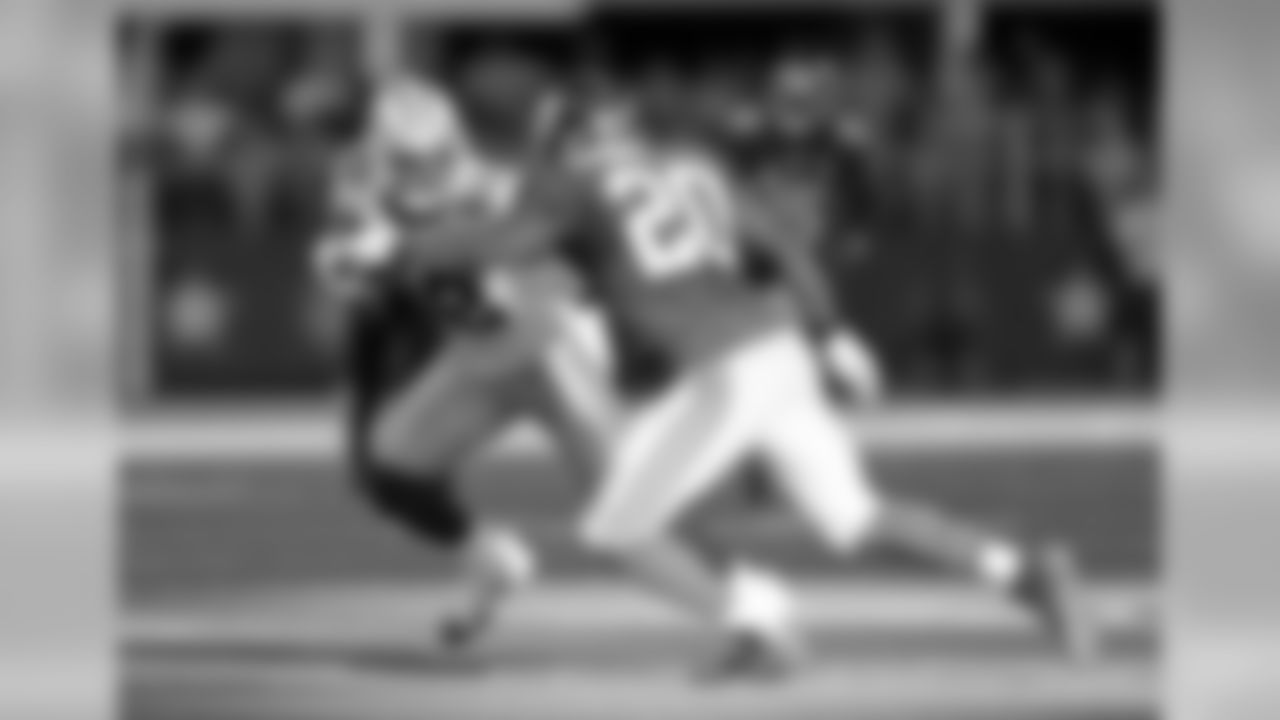
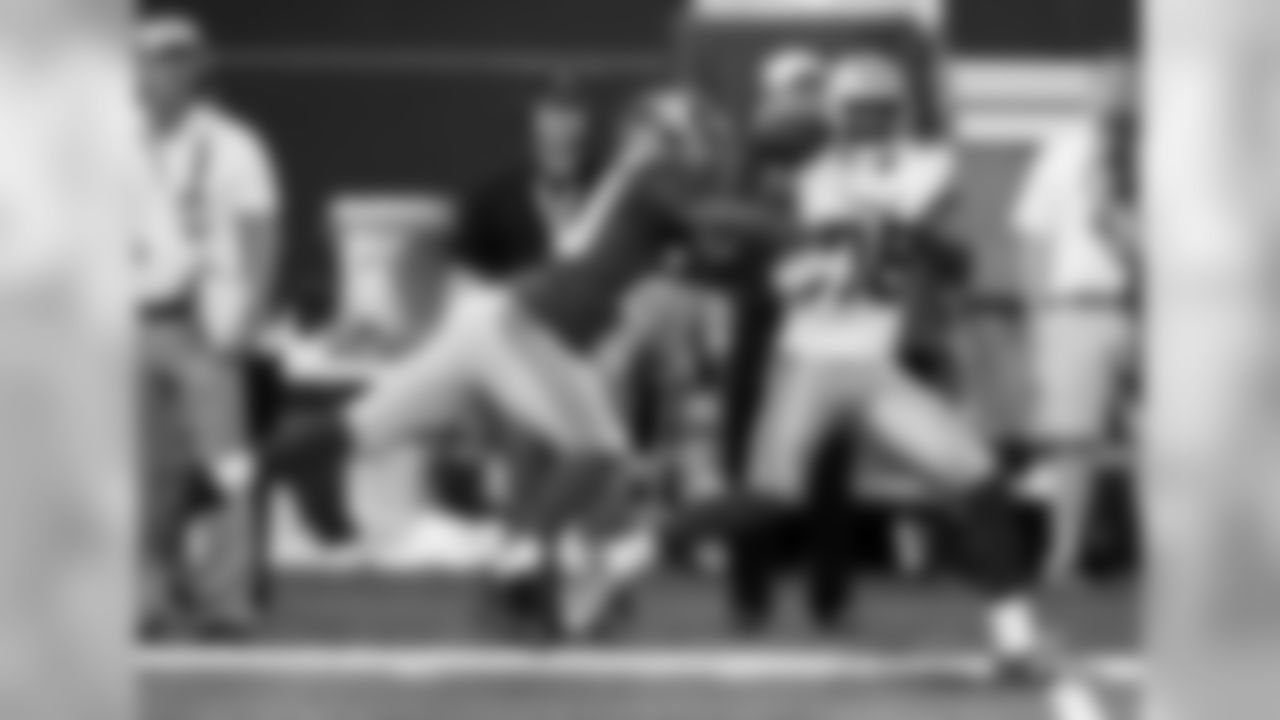
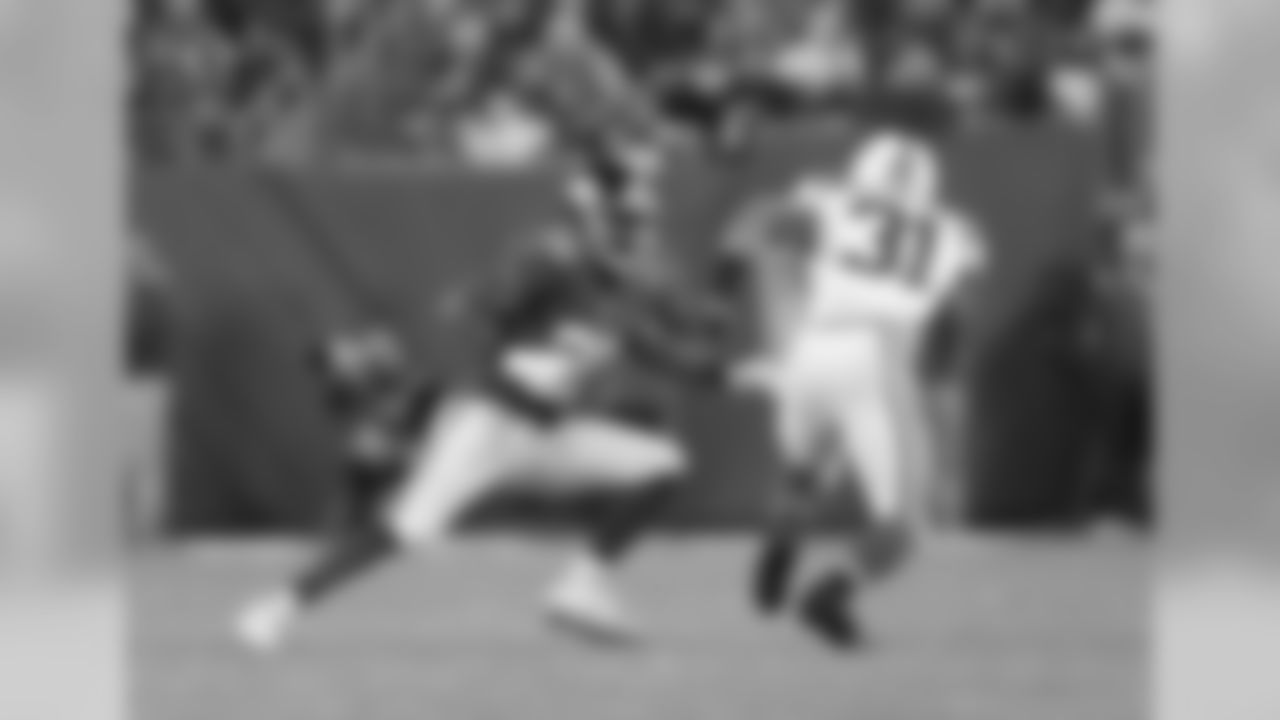
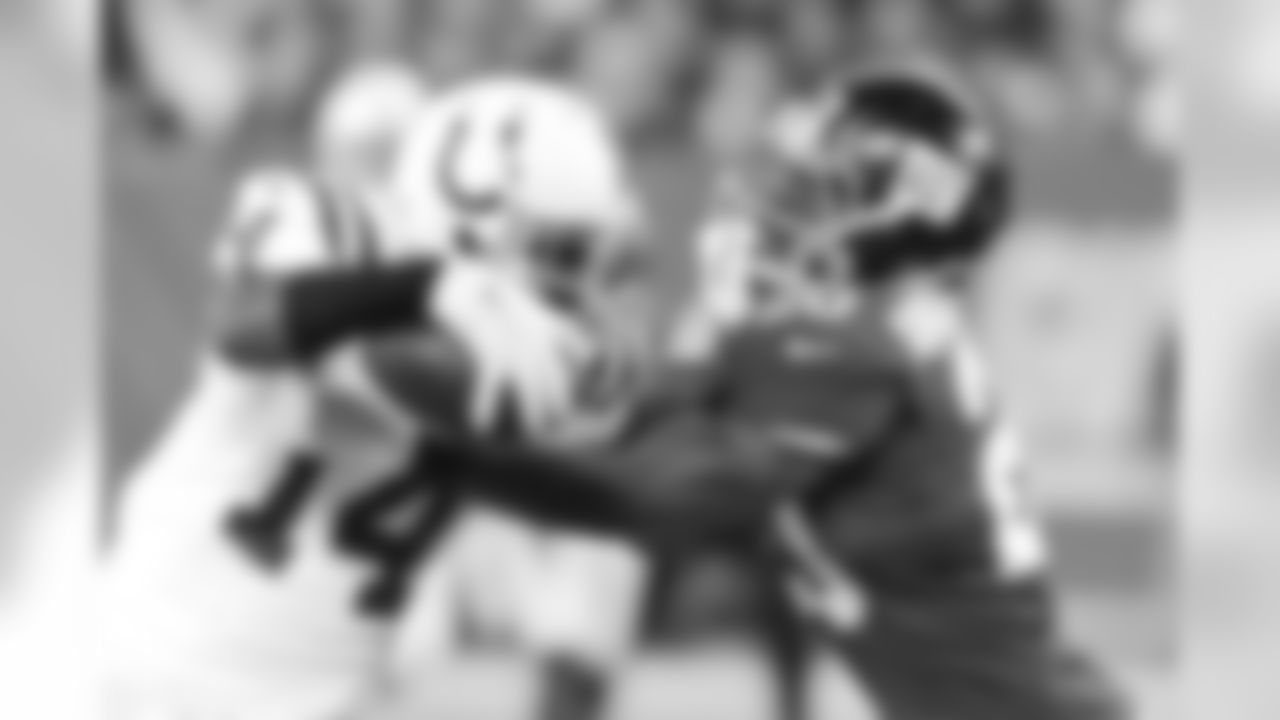


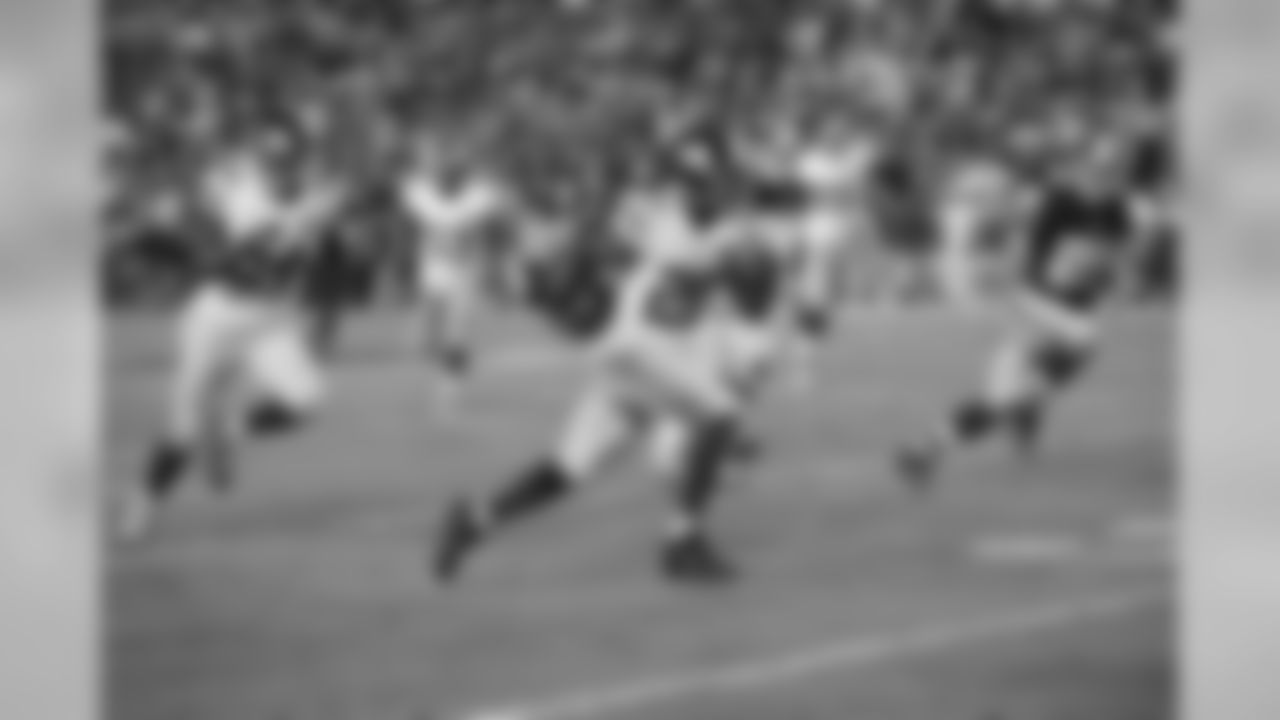


Q: You were born in Massachusetts and lived in New Jersey for a little while before your family moved to Arizona when you were five. Do you have any memories of moving?**
|
|||||||||||||||
Amukamara: "I did kindergarten here for half the year and then I went to Arizona. I finished kindergarten there. I was introduced to football at five years. I think it was recess – that's what we called it back then - it was like play time. All of the other guys were playing backyard football with flags, so you'd have a red team and a blue team and instead of a kickoff you had a throw-off. The guy would run it and you would try to deflect and start from there. So that's the type of flag football it was. I was five, so I was a little kid, and I was playing with the sixth graders and they never gave me the ball. And then one time, I don't know if I was crying or I was complaining, the quarterback felt sorry for me and said, 'Here,' and threw me the ball and I just took off. They got me down at the one-yard line and when they saw that then boom, I instantly became the popular little kid that could play with the older guys."
Q: Were you intimidated playing with kids who were much older than you?
Amukamara: "No, because I had these shoes with the cartoon Sonic the Hedgehog. In the video game Sonic the Hedgehog is very fast, so I always thought those shoes made me fast and I thought, 'OK, as long as I have these shoes I'm not going to get caught.'"
Q: Your parents grew up in Nigeria. Who came to the United States first, your mom or your dad?
Amukamara: "My dad. My dad came over just like anyone else, for more opportunity and a better life for him and his kids. While he was over here by himself he was going to school. I don't know if he was trying to get a visa or just trying to establish himself so he could bring my mom over. He ended up joining the Army for a little bit, around four years, and then got out and then brought my mom here."
Q: And your mom was a police officer in Nigeria?
Amukamara: "Yes, my mom was a police officer, so any time we tried to get things by her she'd say, 'You know I worked in the police, I've seen it all, so you can't get by me.'"
Q: What did your dad do?
Amukamara: "He did a lot of stuff. He was a hustler. He worked as a cab driver, he made money doing that and then I don't know if he was a clerk but he did a lot of little side jobs.
Q: Your mom was a sprinter in the 1984 Olympics. Do you get your athletic genes from her?
Amukamara: "That's what she says, and my dad played soccer. We all ran track in high school, so she enjoyed that. She could give us her piece of advice."
Q: Don't you have royalty in your family?
Amukamara: "My dad's grandpa was a king of a village in Nigeria, probably a village of maybe 500 people. In our culture, if you're the first son you get the title as a prince. So my dad is also a prince and so am I."
Q: Did kids when you were growing up ever make fun of your name?
Amukamara: "Not that I can remember, but you always get the most cliché pickup lines from like girls like, 'Hey, can I be your princess?'"
Q: What was it like growing up with five sisters?
Amukamara: "It was great, to be honest. I didn't really think about not having a brother because I probably treated most of them like boys by always fighting with them. I always had a lot of free time, because in our culture my mom was so strong on the women doing everything they were always cleaning and stuff like that. It kind of hurt me, because I was enabled. When I went to college I had three other roommates and any time I would leave my clothes anywhere or my food anywhere they would get mad like, 'Hey, what are you doing? We're not picking up for you, we're not your servants.' So I had to get used to that real quick."
Q: So your sisters did all these chores around the house and you just watched?
Amukamara: "Exactly. I owe them big time."
Q: Were you a good student in school when you were young?
Amukamara: "I had favorite topics and I always enjoyed school, the friend part, the whole sports part and the whole school spirit. I would say I got good grades, I always did my work. I always told myself, 'As long as I turn my work in, that gives me a chance to pass.' But high school was very tough for me, because I wasn't really studying something that I was interested in. In college, I got to do that."
Q: Did you play sports whenever you could?
Amukamara: "I played every type of active sport – football, basketball and track. Basketball was probably my favorite."
Q: You had quite a high school career - 50 touchdowns, three basketball titles. When you think of high school, are your first thoughts of sports?
Amukamara: "Yes, especially my senior year. I finished second or third in the state in the high jump as a sophomore or junior. And then I won the 100 and 200 in track, and basketball was so much fun. I had the most fun playing basketball, because it was air conditioned and practice was great; it was always like a scrimmage, so you're always going against somebody. Everyone gets the ball, everyone gets the glory of shooting or passing or just touching the ball. I really enjoyed playing basketball. In football, one of my goals was to be the Arizona Player of the Year, which I was, and I'm glad I accomplished that."
Q: Were you a point guard in basketball? Were you good at distributing the ball?
Amukamara: "I was definitely a leader on the court and just getting the offense set up. It's funny, because I played running back in high school, so I played offense in football but in basketball my role was defense. My role was, 'Go take away the best player.' As a freshman if it was a center I would go take the center, but on the varsity it was more like the shooting guard. I always got confused like, 'Why aren't I good on offense in basketball, but I'm amazing at offense in football?' Now that's kind of my job, to go against the best guy on offense. So it's funny how that worked out."
Q: So your basketball training helped you prepare for the NFL.
Amukamara: "I guess it did. It gave me that mindset."
Q: Did you ever think or hope that you would go to college to play basketball?
Amukamara: "I actually had a couple of scholarship offers. I think Northern Arizona and San Diego State showed some interest. But my basketball coach told everyone, 'This kid is going to play football, he's not going to play basketball.' So he shut that down pretty quick."
Q: How did you wind up at Nebraska?
Amukamara: "Good question. I have a best friend by the name of Eric Hagg, he went to Ironwood High School in Glendale, Arizona. We met at this Fellowship for Christian Athletes camp and we became best friends. I started going to his games and he started going to my games in high school. He was real good, he played wide receiver. We were getting the same offers and we just said, 'OK, we're going to do this as a buddy decision. We're going to set up our visits the same and wherever you commit I'll commit and vice versa.' So we went to Nebraska on our first trip. We didn't know where Nebraska was or what to expect. We're from the west coast, we're from the valley or the cities, so going to Nebraska was a huge culture shock, it was completely different. We didn't know what we were in for.
"Recruiting trips are fun, so we had fun. We were only there for two days. The next day the head coach wants to sit down and talk to you, so he asked Eric, 'How would you rate this trip out of 10.' And Eric said, 'I'd give this a nine out of 10.' And coach (Bill) Callahan said, 'Why not a 10 out of 10?' He said, 'Fine, I'll give this a 10 out of 10.' He said, 'Why don't you just come here?' And he said, 'All right, I'm coming here.' When we told me I said, 'No.' I don't think he was all there, probably stayed up too late the night before. Then he told me that I still had trips to Nevada and Fresno State.
"When I went to Nebraska they were looking at me for running back and then Fresno State at wide receiver and Nevada at running back. I said, 'I have to go on a couple more trips. I heard this is the best thing of recruiting, you go on your trips.' So I went to those two and the recruiter from Nebraska said, 'I know you want to go on all your recruiting trips, but we're filling up pretty quick.' He put that pressure on me. I really didn't want to miss out on playing with Eric, but I still wanted to take more trips. Oregon State offered and Florida State came in and UCLA and I said, "I want to see these schools.' And then I just said, 'You know what, I'll just go to Nebraska.' And that's what I did.
Q: Were you glad you did?
Amukamara: "At first I didn't like it, because they switched me to defense and I wanted to transfer. And then we got Bo Pelini there (in 2008, as head coach). I said, 'Hey, can I play offense? That's what I was supposed to play, but they switched me.' He said, 'I have no problem with you playing offense, but I've coached a lot of DBs and I feel like you can make a lot of money one day playing this position.' Sure enough, he was right."
Q: Are Eric and you still close?
Amukamara: "Very close. He was the best man in my wedding earlier this year, so it was great."
Q: How do you look at your time in Nebraska? You were a young man from the desert who went to school in the Midwest. Was it tough culturally? Did you enjoy the football?
Amukamara: "Going to Nebraska was one of the best decisions I ever made. It showed that I was very sheltered growing up in Arizona. I learned so much about people there, so much about adapting to a different environment. I just love the whole state of Nebraska, because I really love that small town feel. It's night and day from New York and New Jersey. Everything is just slow, steady water. People are nice, no one is in a hurry and it's cheap to live there. I tried to convince my wife, 'Hey, we're going to live there.' She's from Sacramento, California and she wants to grow a lemon tree in her back yard. You're not growing lemon trees in Lincoln, Nebraska. It's crazy because every time I drive over there in Nebraska my road rage is definitely up a couple more notches. No one is in a hurry to get anywhere, so I feel like honking at people - 'Come on, move.'"
Q: What was the highlight of your football career at Nebraska?
Amukamara: "My sophomore year I was with coach Pelini and I wasn't starting. I got in a couple of games at nickel and corner and made some plays. My sophomore year was really when I started playing corner and my junior year was when I started playing. I just started to get a feel for it. At first I was thinking, 'There's no way possible that these cornerbacks can play a whole game backwards.' Backpedaling, shuffling back, running and reacting when the receiver reacts. It just seemed tiring, it seemed unbelievable. I couldn't fathom it. So my junior year, I got a pick against Oklahoma, which was a huge rival of Nebraska. It was at home, it was a night game. I almost returned it for a touchdown. That was probably my key moment. I started to make a name for myself. There was this NFL position tracker and it shows you where you're ranked out of the corners. Early that year I looked at it and I was like 99, no one'd heard of me. I was like, 'Why haven't these people heard of me? I think I'm pretty good.' I started making plays, I started getting picks and then the next thing you know I'm ranked 10 out of 999 or however many corners. I finished the year with five picks and the next thing you know Mel Kiper is saying I'm on his big board. Mel Kiper is probably not 100 percent right, but he's close. The guys he talked about most are likely going to get drafted. That's when I first thought I had a shot at the NFL, a very good shot. I guess I needed Mel Kiper's affirmation to let me know that I was good. I switched my major from political science - my dad wanted me to be a lawyer - to sociology, which I thought was easier. I had a pretty good senior year and then I got drafted."
Q: Do you think you could have made it as a running back?
Amukamara: "No, because with my body size I don't think I would like to fill in a hole with a Jon Beason or a Jameel McClain or a Mark Herzlich coming at me. I just see how much pounding that they take week in and week out. I'm into my fourth year. According to the statistics, I probably would have been done this year, so I'm definitely glad I didn't make that decision."
Q: Did you get your degree?
Amukamara: "Yes. I graduated in 3½ years and I switched my major, so I'm definitely proud that I got that. It's just cool to have, it's just cool to say that you have an undergraduate degree."
Q: Antrel always talks about the guys from The U (Miami) and how close they are. Are you still friendly with your guys from Nebraska?
Amukamara: "(Zack) Bowman's on the team. I came into Nebraska when Bowman was a senior and he was headed out. Josh Brown is here, but I have guys like Roy Helu of the Redskins, Niles Paul for the Redskins and stuff like that.
"Suh is great. I'm pretty cool with Suh. We never got to hang out much in college, because he was older and I was still going to house parties and he wasn't going to house parties. Guys like that, that whole black shirt crew. That's what they call us over there. I think there's always a bond."
Q: What was your reaction when you heard you were going from Lincoln to New Jersey?
Amukamara: "First of all, I thought everything was in New York, so I thought I was going to live in the city."
Q: Had you ever been here before?
Amukamara: "No, not New York City. The first time I was in New York City was draft weekend and I got to go on my first subway. I did everything a tourist could do except go to the Statue of Liberty. I saw Times Square and stuff. When I found out everything was in New Jersey, it was kind of confusing. I didn't know what I was in for. Everyone kept talking about the media, saying, 'It's a big media market.' I never knew what that meant, but after experiencing the Super Bowl my first year and then experiencing 0-6 (in 2013) and how the media covers everything I do. I'd ask my friend Eric in Cleveland, 'Do you guys have 20 people in your locker room every day?' He said, 'No, we only have one or two.' I was like, 'Wow.' But I'm definitely glad I'm here. That city over there is fun. There's a lot to do."
Q: Your rookie season was the year of the lockout, so you had no offseason program. You missed the first few days of training camp and broke your foot soon after stepping on the field. How difficult what was that for you?
Amukamara: "My faith was definitely tested. I didn't know what was going on. To break my foot the second day and for it to be a freak accident … I felt good, I thought I was well conditioned and then snap. I hadn't broken anything in my body, so it was tough, especially when you're on social media and everyone is saying, 'You're a first-round bust, why did we draft you?' I had to stop looking at that, because it wasn't helping my case. I'm really thankful that I had friends and family always texting me and making sure that I was OK and making sure that my head was always in it. I'm thankful that I had vets and (cornerbacks) coach (Peter) Giunta always staying on me to stay prepared mentally and always listening in the meeting room and asking questions."
Q: You are quiet and cerebral. Do you change personalities on the football field?
Amukamara: "I would say more so in practice. And especially this year, I think this year I've started to maybe come out of my shell a little more, just be more comfortable. I have a sense of peace and joy now, because I know what I'm capable of doing in this league. I feel like when you have a lot of reps against a lot of different receivers you're not surprised, you know who you can guard and you know who you might have trouble guarding. So you get a confidence that you know what to expect. When you know what to expect I think it will set you up for success. This is my fourth year coming in, and with that comfort and confidence I've been more vocal with these guys. Antrel (Rolle) and I are the guys in the defensive backfield that have been here the longest, so I feel like I have a voice on the team."
Q: You patiently talk to the media in good times and bad. Is that important to you to be accountable like that?
Amukamara: "I don't think my spirit should be shaken whether we win or lose. I'm going to definitely feel bad if we lose, but I think at the end of the day it's about being a man and not running away from the media and always addressing those hard questions. For example, everyone knows the cold tub thing (when some teammates dropped him in a tub in training camp). I didn't want to talk about that every time. But I knew if I kept avoiding it, the question was going to be left unanswered and if a question's unanswered it's always going to be asked. I figured just face it and answer it."
Q: You got married this past year to Pilar Davis…
Amukamara: "We had a private wedding with just me, her and George (McGovern), the team chaplain. Will Beatty and his wife were our witnesses, because they lived across from us. We did it over our bye week last year on a Monday (Oct. 28) right after we beat the Eagles, so everything was great. And then we had a more public wedding in March in Arizona."
Q: You're a very giving person and you donated $10,000 to Lincoln High School in Nebraska. Is it important to you to take some of what you've been able to earn and help other people?
Amukamara: "It is. I think my relationship with Christ motivates me to give and to be generous. (Ndamukong) Suh gave $2.6 million to Nebraska and I was like, 'Uh, I'm probably not going to give that much.' Especially to Nebraska. I love Nebraska, but they're never going to be in debt, they're never going to be bankrupt. They have a great booster club. So I'm thinking, 'How else can I help the city that I spent four years of my life in?' So then I was thinking, 'Why not donate some cleats and some gear to a local high school?' Lincoln High School was just one of those schools. I had some friends that went to that school. I got in contact with the coach. I would say giving is definitely important, and my wife is very generous too, so it kind of helps me be generous, also."
Q: If the Giants' community relations department asks you to do something and you're available, you'll do it?
Amukamara: "Yeah, yeah, yeah, for sure. Jen Conley and Allison Stangeby…I wouldn't say I'm their go-to guy, but I would say I'm one of them because it's always good just to interact with the community that you live in and show your face. It's so crazy how a signed ball, a signed jersey or just a hello from somebody … I don't know if they look up to, but that you see on T.V. or that you think is famous. It's just crazy what that can do.
"I wouldn't call myself a celebrity groupie, but I enjoy people that I grew up watching or seeing or watched on T.V. So any time I get to see them in person, however these fans act like toward me, I act the same way to them. I'm always asking them for selfies, for pictures. I never ask for autographs, because autographs don't do much. But I definitely ask for a selfie and a picture. I think that does it for me. I've been turned down just like I've probably had to turn down other people, but that's all part of it."






